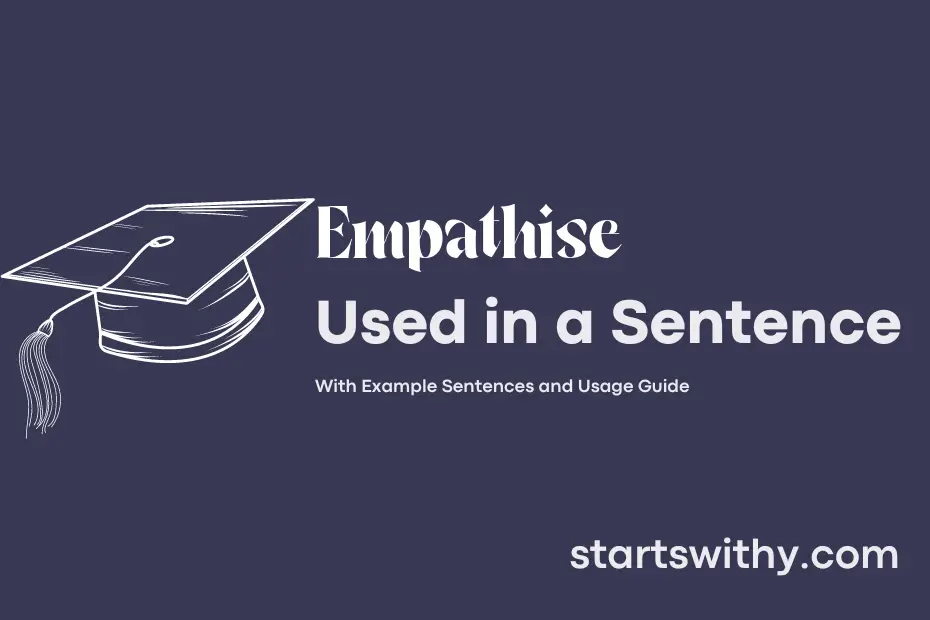Have you ever struggled to truly understand someone else’s feelings or perspectives? Empathy, the ability to empathize with others, is a fundamental aspect of human connection and compassion. It involves putting yourself in someone else’s shoes and feeling what they feel.
When you empathize with someone, you are able to understand their emotions, thoughts, and experiences in a deeper and more meaningful way. It allows you to offer support, comfort, and solidarity to others during difficult times. Empathy fosters stronger relationships and builds bridges between people of different backgrounds and beliefs.
7 Examples Of Empathise Used In a Sentence For Kids
- Empathise with your friends when they are sad.
- It’s important to empathise with others and show kindness.
- Let’s try to empathise with how others are feeling.
- We can empathise by listening and trying to understand.
- When someone is hurt, we should empathise with them and help them feel better.
- How would you feel? Let’s empathise with each other.
- Remember to empathise and be a good friend to everyone.
14 Sentences with Empathise Examples
- Empathise with your classmates who may be struggling with the workload and offer to study together.
- Don’t forget to empathise with your roommates who might have different schedules and habits.
- It’s important to empathise with students from different backgrounds and respect their perspectives.
- Empathise with your friends who are feeling homesick and offer your support.
- Take the time to empathise with your professors who also have their own challenges and responsibilities.
- Empathise with your peers who are facing mental health struggles and offer a listening ear.
- Remember to empathise with international students who may be feeling out of place in a new country.
- Don’t forget to empathise with your teammates during group projects and understand their viewpoints.
- It’s important to empathise with committee members who are juggling multiple responsibilities.
- Take a moment to empathise with your juniors who may be feeling overwhelmed by academic pressure.
- Empathise with your roommates if they are experiencing financial difficulties and offer your support.
- It’s crucial to empathise with classmates who may have faced discrimination and stand in solidarity with them.
- Empathise with your friends who are dealing with relationship issues and lend a supportive shoulder.
- Remember to empathise with yourself too, and give yourself grace during times of stress and uncertainty.
How To Use Empathise in Sentences?
To properly use Empathise in a sentence, start by identifying a situation where you want to showcase understanding or compassion towards someone. For example, “I can truly empathise with your frustration about the project deadline being moved up.”
Next, find an appropriate time to use the word Empathise in your sentence. This can be during a conversation, writing an email, or texting a friend. Make sure the context fits the meaning of the word.
Ensure that the sentence highlights your ability to understand and share the feelings of the other person. For instance, “I empathise with how overwhelmed you must feel with all the changes happening at work.”
Remember that Empathise is a verb, so it should be used in a sentence to convey an action of understanding and relating to someone else’s emotions or experiences. Practice using Empathise in various scenarios to become more comfortable incorporating it into your vocabulary.
Overall, using Empathise in a sentence is a powerful way to show compassion and connection with others. It demonstrates your willingness to listen and understand someone else’s perspective.
Conclusion
In conclusion, using sentences that empathise with others by acknowledging their emotions and validating their feelings can significantly improve communication and build stronger connections. By expressing understanding and compassion through words, we can create a supportive and inclusive environment where individuals feel heard and valued. Whether in personal relationships, professional settings, or everyday interactions, practicing empathy in sentences can foster trust, promote unity, and enhance overall well-being.
Empathy-driven sentences have the power to bridge gaps in understanding, facilitate meaningful conversations, and promote a culture of empathy and kindness. By incorporating empathetic language into our everyday interactions, we can cultivate a more compassionate community where people feel seen, heard, and understood. Let’s strive to use sentences that empathise to nurture understanding and build more meaningful connections with others.




